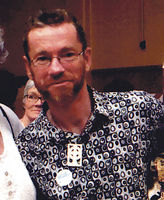 Chaplain to the deaf community David Loving-Molloy is concerned that deaf children are not being taught New Zealand sign language, which is an official language of the country, because it is not compulsory at school.
Chaplain to the deaf community David Loving-Molloy is concerned that deaf children are not being taught New Zealand sign language, which is an official language of the country, because it is not compulsory at school.
Returning from a conference in Rome on The Deaf Person in the Life of the Church, Mr Loving-Molloy said deaf communities needed to assert their cultural identity through their language. But this was difficult because deaf children were not fluent in the language.
He said the community should be ‘using visual technologies to promote the use of sign language and train people to pass on deaf cultural heritage’.
To some extent the emergence of the cochlear implant has meant that ‘many deaf children are now growing up speaking English very well’.
In the past when the implants were not so accessible, ‘parents doubted the education system could equip deaf children with good English skills unless they were taught through the oral method. This meant that NZSL has not played a large role in deaf education in New Zealand.
‘Now that cochlear implants are more prevalent, there is no good reason why deaf children cannot grow up bilingual … this solution would have the double benefit of informing deaf children about deaf culture and history and also help preserve NZSL.’
He advocates using visual technologies to promote the use of sign language and train people to pass on deaf cultural heritage.
Even though the November conference in Rome was organised by hearing people and therefore not sensitive to deaf culture, some strong recommendations were ‘extraordinary and far-reaching’.
Mr Loving-Molloy hopes the international bodies can work more closely to capitalise on the recommendations to promote a deaf cultural view of the Deaf Person in the Life of the Church.
For more information email catholic.deaf@pndiocese.org.nz.